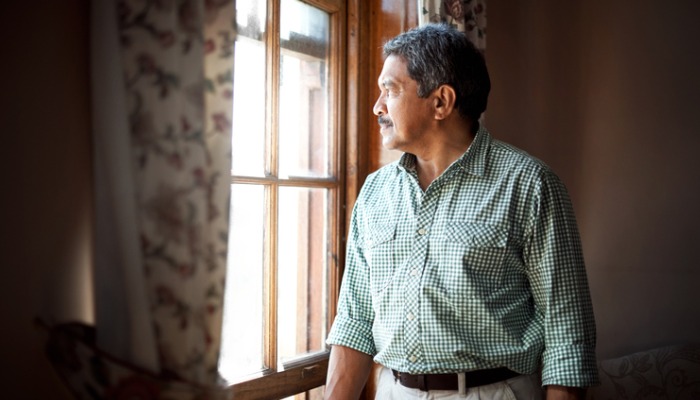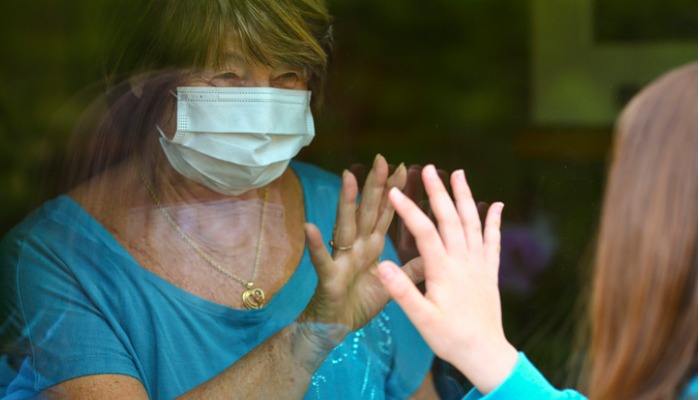Tough times for the older generation
In Older care
Follow this topic
Bookmark
Record learning outcomes

Older people’s physical and mental health has been a concern throughout the pandemic, with many shielding at home for most (or all) of the past year. Many haven’t seen their family and friends for months or been able to access parts of their support network or services.
Research published by Age UK in October revealed that while some older people have been coping with the pandemic, a sizeable minority are finding life incredibly tough. Those who are not very well and have long-term health conditions were particularly likely to report that this is an extremely challenging time for them.
“This pandemic is tough for everyone, but older people have the added anxiety of knowing that for them the risks of catching Covid-19 are higher,” says Caroline Abrahams, Age UK’s charity director. “We have rightly heard a lot about the enormous problems facing people in care homes, but this research reveals that life is extremely challenging for many cooped up for month after month in their own homes too.”
In November, The Physiological Society and Centre for Ageing Better called for a national Covid-19 resilience programme to keep older people healthy and resilient, especially over the winter months. The expert panel on the project brought together 20 leading scientists and clinicians working in the fields of physiology, nutrition and physiotherapy.
YouGov polling for the project found that almost one in three older people did less physical activity during the first lockdown last March. Of those, 43 per cent said that this was because they no longer had a reason, or had less reason, to get out of the house and be active; 32 per cent were worried about catching Covid-19, and 29 per cent reported lacking motivation to exercise.
Home confinement in older people can be associated with muscle loss, body fat gain and the development of insulin resistance, which are driving factors in the development of weakness and type 2 diabetes. “Lockdowns, while important to reduce transmission of Covid-19, can have a detrimental effect on both the physical and mental health of older people,” says Paul Greenhaff, professor of muscle metabolism at the University of Nottingham, and co-chair of the expert panel. “These changes happen rapidly, within three days of not using muscles.
“People can experience significant decreases in muscle mass and quality, which might be the difference between an older person being able to get out of a chair by themselves or not. Older people need clear, tailored guidance about how to keep healthy and resilient, which covers physical activity, nutrition and mental wellbeing.”
According to the expert panel, a national programme should include:
- a tailored exercise programme focused on older people with key Covid-19 risk factors
- clear guidance about the importance of a healthy balanced diet containing sufficient levels of protein and appropriate energy
- the creation of virtual communities to counter social isolation and enhance mental health
- enlisting the help of relatives and volunteers to support behaviour change among older people.
Social care needs
A House of Lords Science and Technology Committee on Healthy Ageing report in January revealed that while people are living longer, many of those extra years are spent in poor health, and the pandemic has highlighted the need for close coordination between different parts of the health and social care systems. Two million people in the UK aged over 75 live alone and could be at risk of loneliness; improving access to technology that enables older people to connect with friends and family is essential.
Back in November, Age UK warned that one in seven older people receiving care before the pandemic have since seen a reduction in the care they receive. Ms Abrahams says that the older population’s need for care has been increasing during the pandemic, despite less care being available to them. Ordinary activities, such as going upstairs or washing, have become difficult, and previously independent older people have become reliant on walking aids to move short distances, which they used to manage with ease. This can increase their susceptibility to falls and ill-health.
“A number of patients we are in touch with have been struggling with mental health issues,” says Lila Thakerar, superintendent pharmacist at Shaftesbury Pharmacy in Harrow. “They feel lonely not being able to go out for a walk or having day-to-day contact with other people. Many have been sitting in the same armchair every day or just walking a few steps in their home for months. They haven’t been visiting doctors or other support services, and quite a few have gone downhill in their physical and mental health.”
Two million people in the UK aged over 75 live alone and could be at risk of loneliness
According to Ms Thakerar, medication has been one constant in many older people’s lives since the beginning of that first lockdown a year ago. “Pharmacy is one of few primary care services that patients still have access to,” she says. “Some may have monthly medicine deliveries; others may have weekly dossette boxes or dressings delivered more than once a week. We always ask older customers how they are getting on when they call us up. If we are worried about anyone, we speak to their surgery, who can then signpost them to whichever service is necessary.”
Some pharmacies are helping their older customers, especially those living alone, with other aspects of daily life. “We have been looking after some of these patients for 20 to 25 years,” Ms Thakerar says. “We have a Tesco next door, and some patients ask whether the driver can bring items such as toilet roll, vitamins and incontinence pads with their medication delivery. This isn’t a digital or cyber generation. Many older patients have never used email or the internet, so can’t visit a website. Some of them aren’t even sure if their GP surgery is open, and struggle to cope with the long answerphone messages, so we have emailed their GP on their behalf.”
Signposting
Older pharmacy customers can be signposted to the following organisations for help, advice and support:
- Age UK (helpline 0800 055 6112 and www.ageuk.org.uk)
- Independent Age (0800 319 6789 and www.independentage.org)
- The British Red Cross (0808 196 3651 and www.redcross.org.uk) offers support for people returning home from hospital
- The Silverline (0880 470 8090 and www.thesilverline.org.uk) is a 24-hour helpline for older people
- The Older People’s Advocacy Alliance (www.opaal.org.uk) provides independent advocacy services for older people.
Self care advice
Age UK’s research found evidence of new and emerging cognitive decline in older people. This may have happened anyway, but some families believe it has been exacerbated by social isolation and a lack of mental stimulation, which has left older people more forgetful and confused.
Mild cognitive impairment (MCI) affects 15 to 20 per cent of people aged 65 and over. People with MCI may be more likely to suffer from depression and anxiety due to the frustrating and isolating symptoms, which include problems with memory, language, thinking and judgement. MCI can be an early stage of dementia, but other conditions, such as depression, low vitamin levels and thyroid problems, can also cause similar mild memory problems.
Clinical research conducted by the University of Sherbrooke in Canada, published in Alzheimer’s & Dementia: The Journal of the Alzheimer’s Association, has established that people with MCI experienced significant improvement in cognitive function when consuming a specialised ketogenic drink (BrainXpert Energy Complex) twice a day for six months. Clinical researchers behind the treatment say the hope now is to investigate if ketones can slow down the progression of Alzheimer’s disease and other forms of cognitive decline linked to ageing.
This isn’t a digital or cyber generation. Many older patients have never used email or the internet, so can’t visit a website
Age UK research has also found that some older people are experiencing increased pain due to untreated health conditions. These have impacted on appetites and diets, which threatens to weaken their resilience further.
New research from Mentholatum for its Regenovex Actiflex brand found that nearly three in five people with joint problems say the cold is the type of weather that most affects their joints, bones and muscles. “The impact of the weather is a real phenomenon,” says Dr Emma Derbyshire, public health nutritionist. “Scientific studies from the past five years show that weather impacts on the joints, with barometric pressure, temperature, humidity, precipitation and wind being key factors.”
Pharmacies can offer customers with joint pain a range of over-the-counter products, from analgesics (oral and topical) to natural supplements. “Early intervention is key, especially when dealing with the impact of joint conditions on an ever-aging population,” says physiotherapist Sammy Margo.
“Pharmacists can play a pivotal role in encouraging and supporting people to look after their joints. By promoting lifestyle changes and a well balanced diet, including the recommendation of targeted joint supplements, such as LanesHealth GOPO Joint Health Plus Ginger, pharmacists can help to protect and repair patient’s joint health.”
Incontinence is often seen as a taboo subject, yet many older customers will experience it to some degree. “It is vital that community pharmacies provide the necessary product advice and support,” says Alex Staw, marketing manager UK & Ireland at Ontex Healthcare.
“Ontex can provide pharmacies with nurses qualified in the field to offer product training and support advice for pharmacy staff, category management tools to help display and grow sales, and e-learning and online support around types, causes and best practice advice for incontinence. We can also provide patients and their carers with materials on improving incontinence symptoms, including diet and exercise tips.”
Views from the P3pharmacy category panel
“Most of our older customers prefer to go to their GP as they get free prescriptions. However, common reasons for them to come to the pharmacy first are joint pain, indigestion, constipation and knee and ankle supports. Best sellers include Gaviscon for indigestion; ibuprofen gels for joint pain (mostly generics, although some do ask for Nurofen), and Dulcolax and Senokot for constipation. I’d advise keeping a good selection of products on display so customers can browse easily.”
Lila Thakerar, Shaftesbury Pharmacy, Harrow
“This is a very big area for us. Since Covid, we have been getting more of the older population asking all manner of self help questions that would normally have been addressed during routine GP appointments. For indigestion – our biggest sector – we do well with Gavison and Rennie. Incontinence products are popular, but we tend to supply these on a bespoke basis as the packs are too bulky to keep on display. Tena is our most popular brand.”
Gareth Evans, Wansford Pharmacy, Peterborough
“We can play a role in identifying and referring patients who may be at risk of osteoporosis, or at the very least supply a vitamin D/calcium supplement to help prevent severe fractures. This could be done by running an awareness campaign, speaking to patients and completing the Fracture Risk Assessment tool. I get a lot of queries about what supplements can help with joint pain. Some patients still insist on buying certain supplements. However, multivitamins can be beneficial.”
Ellis Nugent, Well Pharmacy, Llantwit Major, South Wales


Expert Market View
Rachel Hickson, Senior Buyer, Murrays Health and Beauty
Safe and Sound Health has been keeping families safe for over 35 years. Our brand is a one-stop-shop for healthcare products that support consumers in leading a healthy, active life. You can find Safe and Sound Health products in over 10,800 pharmacies, and 95 per cent of pharmacies say that they trust our brand and would recommend it to customers.
We offer a huge repertoire of healthcare products, from wound care to dental care, but most importantly, we are pillbox specialists and we understand the importance of patients taking their medication as prescribed.
When asked, over 75 per cent of adults over the age of 40 will say they have missed a dose of prescribed medicine. This is one of the biggest obstacles to effective healthcare. We believe our comprehensive pillbox range and free pill reminder app can help.
Safe and Sound Health sales on pillboxes have grown by 25 per cent in three years due to our continuous development of innovative and smart products to suit every need. Our extensive consumer website offers in depth product information and advice on many health-related topics.
We take pride in ensuring we offer an inclusive and affordable range, offering great value products as well as premium products in our Extra range. Our Extra pillboxes include special features such as push button technology, making them perfect for users with limited dexterity, and we include two patient cards to make it easy for users and carers to keep track of daily medication.
We offer a variety of dosage options, as well as solutions for when people are on the go or away from home, and this year, we are launching our first biodegradable pillbox. Made from a wheat fibre mix, it will biodegrade faster than standard plastic, and will be sold in a cardboard display unit, making it completely plastic-free.
Last year, Safe and Sound Health launched a free app that empowers users to take control of their daily medication. The pill reminder app helps patients manage multiple medications and sends them personalised reminders when they need to take their next dose. The app is free to use, free of third-party advertising and requires no user sign-up. Pharmacies can recommend the app to patients struggling to manage their prescribed medication, either alongside our pillbox range or on its own.
As well as organising medication, the Safe and Sound Health range also assists in administration. We offer pill poppers that easily remove tablets from their foil packaging and pill crushers that make it easier to crush and take medicine with water if needed.
In pharmacy, we are growing our display unit offer to make it easy for pharmacies to show products on and behind the counter, or dual site to maximise sales opportunities. The Safe and Sound Health brand is supported with an ongoing marketing campaign, with a particular focus online across various social media channels and via digital advertising.
